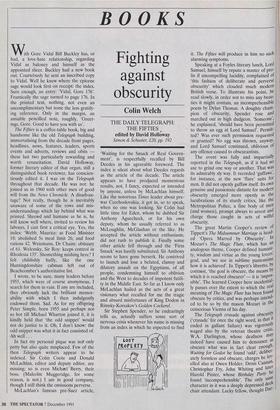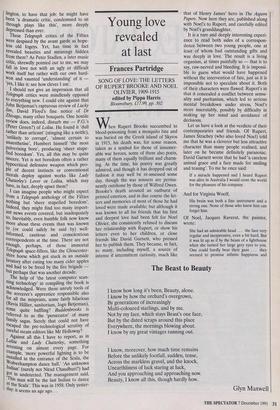BOOKS
Fighting against obscurity
Colin Welch
THE DAILY TELEGRAPH: THE FIFTIES edited by David Holloway Simon & Schuster, £20, pp. 192
With Gore Vidal Bill Buckley has, or had, a love-hate relationship, regarding Vidal as baloney and himself as the appointed slicer. Buckley had a new book out. Courtebusly he sent an inscribed copy to Vidal. Well he knew where the epicene sage would look first on receipt: the index. Sure enough, an entry: 'Vidal, Gore 176'. Frantically the sage turned to page 176. In the printed text, nothing, not even an uncomplimentary but none the less gratify- ing reference. Only in the margin, an amiable pencilled note, roughly, 'Greet- ings, Gore. Good to have you with us'.
The Fifties is a coffee-table book, big and handsome like the old. Telegraph building, immortalising from the decade front pages, headlines, news, features, leaders, sports events and adverts, reviews and obits these last two particularly rewarding and worth resuscitation. David Holloway, former literary editor of that organ, still a distinguished book reviewer, has conscien- tiously edited it. I was on the Telegraph throughout that decade. He was not: he joined us in 1960 with other men of good will from the News Chronicle. A disadvan- tage? Not really, though he is inevitably unaware of some of the rows and mis- understandings which lay behind what was printed. Shrewd and humane as he is, he will know well where, invited to review his labours, I cast first a critical eye. Yes, the index: 'Webb, Maurice: as Food Minister 18; abolished 5s meal limit 26; and food rations 42. Weizmann, Dr Chaim: obituary of 61. Welensky, Sir Roy: keeps control in Rhodesia 135'. Shomething mishing here? I felt childishly huffy, like the one Huntingdonshire cabman left out of Beachcomber's authoritative list.
I wrote, to be sure, many leaders before 1955, which were of course anonymous. I search for them in vain. If any are included, they obviously lack the brilliant memor- ability with which I then indulgently endowed them. Sad. As for my offspring Peter Simple, born 1955 and perhaps not so hot till Michael Wharton joined it, it is kindly held that 'the odd snippet' would not do justice to it. Oh, I don't know: the odd snippet was what it in fact consisted of. Ah well . . .
In fact my personal pique was not only petty but also quite misplaced. Few of the then Telegraph writers appear to be indexed. Sir Colin Coote and Donald McLachlan, editor and deputy editor, are missing; so is even Michael Berry, their boss. (Malcolm Muggeridge, for some reason, is not.) I am in good company, though I still think the omissions perverse.
McLachlan's famous pre-Suez article,
'Waiting for the Smack of Real Govern- ment', is respectfully recalled by Bill Deedes in his agreeable foreword. The index is silent about what Deedes regards as the article of the decade. The article appears to have prod,uced momentous results, not, I fancy, expected or intended by anyone, unless by McLachlan himself. Like the notorious Times leader about pre- war Czechoslovakia, it got in, so to speak, when no one was looking. Sir Colin had little time for Eden, whom he dubbed Sir Anthony Aguecheek, or for his own deputy, whom he usually referred to as McLoughlin, McGlashan or the like. He accepted the article without enthusiasm, did not rush to publish it. Finally some other article fell through and the 'Firm Smack' was hastily substituted. Sir Anthony seems to have gone berserk. He contrived to launch and lose a belated, clumsy and dilatory assault on the Egyptians, of all people, condemning himself to oblivion and the West to decades of impotent futili- ty in the Middle East. So far as I know only McLachlan hailed as the acts of a great visionary what recalled for me the tragic and absurd misfortunes of King Dodon in Rimsky-Korsakov's Golden Cockerel.
Sir Stephen Spender, so' he endearingly tells us, actually suffers some sort of nervous crisis whenever his name is missing from an index in which he expected to find
it. The Fifties will produce in him no such alarming symptoms.
Speaking at a Foyles literary lunch, Lord Samuel, himself by repute a master of pro- lix if uncompelling lucidity, complained of `this fashion of deliberate and perverse obscurity' which clouded much modern British verse. To illustrate his point, he read slowly, in order not to miss any beau- ties it might contain, an incomprehensible
poem by Dylan Thomas. A doughty cham-
pion of obscurity, Spender rose and marched out in high dudgeon. 'Someone', he explained, 'should have been permitted
to throw an egg at Lord Samuel'. Permit- ted? Was ever such permission requested
or granted? No egg was thrown, anyway, and Lord Samuel continued, oblivious of any offence caused to obscurantists.
The event was fully and impartially reported in the Telegraph, as if it had no
axe to grind one way or another. That was its admirably sly way. It recorded 'guffaws', for instance, at the new 'flare' suits for men. It did not openly guffaw itself. Its own genuine and passionate distaste for modern obscurity emerged more openly in the lucubrations of its sturdy critics, like the Metropolitan Police, a fine body of men (and women), prompt always to arrest and charge those caught in acts of wilful obscurity.
The great Martin Cooper's review of Tippett's The Midsummer Marriage is head' ed 'Opera Marred by Obscurity'. In Mozart's The Magic Flute, which has an analogous theme, Cooper defined human': ty, wisdom and virtue as the young lovers
goal, and 'we see in sublime pantomime how it is achieved'. In Tippett's libretto, by
contrast, 'the goal is obscure, the means by which it is reached obscurer' — it is 'impos- sible'. The learned Cooper here incidental- ly passes over the extent to which the real meaning of The Magic Flute has been fame obscure by critics, and was perhaps intend- ed to be so by the mason Mozart in the censorious Vienna of his day. The Telegraph crusade against obscurity ('crusade' for once the right word, in that It
ended in gallant failure) was vigorously
waged also by the veteran theatre critic, W.A. Darlington, whose deafness may
indeed ' have caused him to denounce as
obscure what was in fact clear enough' Waiting for Godot he found 'odd', deliber-
ately formless and obscure, charges he lev-
elled also at Owen Holder, Denis Canna', Christopher Fry, John Whiting and later Harold Pinter, whose Birthday Party he found 'incomprehensible'. The only sane
,_
character in it was a deeply depressed deck chair attendant. Lucky fellow, thought Dar-
lington, to have that job: he might have been 'a dramatic critic, condemned to sit through plays like this', more deeply depressed than ever.
These Telegraph critics of the Fifties were despised by the avant garde as hope- less old fogeys. Yet, has time in fact revealed beauties and meanings hidden from them? As Peter Stadlen, a later music critic, shrewdly pointed out to me, we may fall in love not with an ugly or difficult work itself but rather with our own hard- Won and vaunted 'understanding' of it yes, I like it: see how clever I am'.
I should not give an impression that all Telegraph critics were mindlessly opposed to everything new. I could cite against that John Betjeman's rapturous review of Lucky Jim, David Floyd's fine notice of Dr Zhivago, many other bouquets. One hostile review does, indeed, disturb me — P.G.'s (Peter Green?) of Lolita. He found it 'dull rather than urticant' (stinging like a nettle), unlikely to corrupt', 'almost certain to anaesthetise', Humbert himself 'the most pulverising bore', producing 'sheer stupe- fied boredom'. Yes, all this may be quite sincere. Yet is not boredom often a rather hypocritical defensive weapon which peo- ple of decent instincts or conventional morals deploy against works like Lady Chatterley's Lover or Lolita, which may have, in fact, deeply upset them? I can imagine people who might expect from a Telegraph anthology of the Fifties nothing but 'sheer stupefied boredom'. Indeed, they might find too many import- ant news events covered, but inadequately so. Inevitably, even humble folk now know more about these events than was known to (or could safely be said by) well- informed, cautious and conscientious correspondents at the time. There are not enough, perhaps, of those immortal Telegraph space-fillers, like the Gloucester- shire horse which got stuck in an outside lavatory after eating too many cider apples and had to be freed by the fire brigade but perhaps that was another decade. The help of 'the latest computer scan- ning technology' in compiling the book is acknowledged. Were these unruly tools of the sorcerer's apprentice responsible also for all the misprints, some fairly hilarious (Bevis Hillier, sanatorium, Jogn Betjeman), some quite baffling? Buddenbrooks is referred to as the 'persecutor' of many family sagas. Surely that could not have escaped the pre-technological scrutiny of careful steam editors like Mr Holloway? Against all this I have to report, as in Lolita and Lady Chatterley, something arresting on almost every page. For example, "more powerful lighting is to be installed in the entrance of the Scala, the Wolverhampton dance hall.' An unknown Indian' (surely not Nirad Chaudhuri?) had got in undetected. The management said,
his man will be the last Indian to dance at the Scala'. This was in 1958. Only yester- day: it seems an age ago.. .



























































 Previous page
Previous page